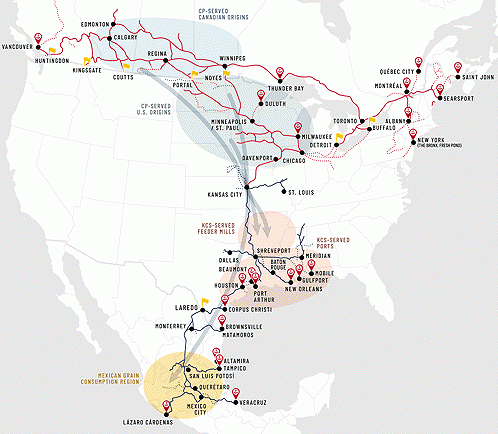 |
| Map prepared by the two companies in 2021 shows their rail lines and the main areas of Canadian grain production, U.S. grain processing and Mexican grain consumption near the lines. |
With federal approval yesterday, the first railroad to span Canada, the U.S. and Mexico has been created. In a $31 billion deal, Canadian Pacific Railway will acquire Kansas City Southern Railroad and become Canadian Pacific Kansas City as early as April 14, Freight Waves reports.
"In approving the deal, the regulator, the Surface Transportation Board, said the new single-line service would shift about 64,000 truckloads a year to rail from the roads, potentially enhancing safety and reducing carbon emissions, and add more than 800 union jobs. The Surface Transportation Board said the merger would not reduce competition," Niraj Chokshi and Mark Walker of The New York Times report. "Martin J. Oberman, the chairman of the five-member board, told reporters, 'On balance, the merger of these two railroads will benefit the American economy and will be an improvement for all citizens in terms of safety and the environment.'"
The Times reports, "The decision came amid mounting concerns with the deal. The Justice Department said it had 'serious concerns' about industry consolidation and asked the regulator to carefully scrutinize the merger. . . . The board has a congressional mandate to take into account the effect mergers would have on transportation for the public and on competition. . . . Oberman noted that Canadian Pacific and Kansas City Southern were the smallest of the large U.S. freight carriers known as Class 1 railroads." The combined firm will also be the smallest, Freight Waves notes. Olberman "acknowledged criticism that the industry had already become too consolidated in recent decades," but told the Times that the merger “will actually provide a stronger competitive landscape." Freight Waves notes that Board Member Robert Primus dissented, citing consolidation cocerns and saying "The transaction will harm communities along the path of the newly combined network."
In reviewing the merger, "The board took into account the environment and other factors," Chokshi and Walker report. "In a detailed review in January, the board found that the merger would have little negative effect on safety, air quality or other concerns, though some communities could see heightened air or noise pollution, it stated." The two railroads have littel if any overlap and are linked by CP's southernmost line, ending in Kansas City. Canadian grain interests hope the new line will ease exports to Mexico.
The Times reports, "The decision came amid mounting concerns with the deal. The Justice Department said it had 'serious concerns' about industry consolidation and asked the regulator to carefully scrutinize the merger. . . . The board has a congressional mandate to take into account the effect mergers would have on transportation for the public and on competition. . . . Oberman noted that Canadian Pacific and Kansas City Southern were the smallest of the large U.S. freight carriers known as Class 1 railroads." The combined firm will also be the smallest, Freight Waves notes. Olberman "acknowledged criticism that the industry had already become too consolidated in recent decades," but told the Times that the merger “will actually provide a stronger competitive landscape." Freight Waves notes that Board Member Robert Primus dissented, citing consolidation cocerns and saying "The transaction will harm communities along the path of the newly combined network."
In reviewing the merger, "The board took into account the environment and other factors," Chokshi and Walker report. "In a detailed review in January, the board found that the merger would have little negative effect on safety, air quality or other concerns, though some communities could see heightened air or noise pollution, it stated." The two railroads have littel if any overlap and are linked by CP's southernmost line, ending in Kansas City. Canadian grain interests hope the new line will ease exports to Mexico.
No comments:
Post a Comment